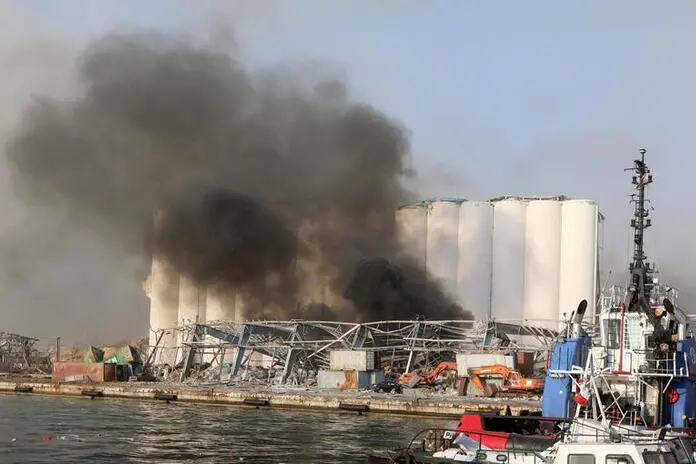PHOTO
BEIRUT: Beirut is a devastated city. No other word could describe the city after the nuclear-like blast that rocked it on Tuesday afternoon wiping out almost everything after nearly three tons of highly explosive and dangerous chemicals destroyed everything at a 1-km radius and the damages covered a 15km radius.
Shortly before midnight, the Higher Defense Council in Lebanon declared the capital a disaster-struck city and recommended that the cabinet calls for a state of emergency.
Only one word can describe the size of damage that has spread across the Lebanese capital: Catastrophic.
The eastern part of Port of Beirut is completely destroyed and the view is worse than that of the 2006 Israeli aggression against Lebanon.
Military sources told Arab News the explosive chemicals were confiscated few years back, and were irresponsibly stored at Beirut’s port under the orders of the judiciary at a close proximity to residential and commercial areas.
What is more dangerous, was the toxic cloud that shrouded the city following the explosion, with health officials warning against inhaling the smog. Ammonium nitrate, as per warnings received on mobile phones, could well stay in the air overnight till the next day.
Yet people casually wandered across downtown area, with some not even donning masks to protect them from Covid-19, let alone toxins taking photos as if nothing would harm them.
One would say with one crisis after the other, the population has grown indifferent to catastrophes.
Ambulance sirens could still be heard throughout the night as paramedics and volunteers rushed to move thousands of injured persons as well as dead bodies.
Several hospitals close to Beirut’s downtown area, especially in Beirut’s Eastern suburb of Achrafieh were completely shattered by the blast, leaving scores of dead and injured bodies among the patients and nearby residents.
The least critical cases were moved to nearby parking lots while the critical cases were rushed to other hospitals elsewhere outside Beirut, under the strict orders of the Health minister Hamad Hassan that everyone be treated on the expense of the state.
Shortly before midnight, the death toll reached 73 persons.
The number may rise, according to Health officials as missing persons “are turning up dead or critically injured under the ruble of houses and offices that were wiped out by the blast.”
The blast was heard over 60km down south, and the impact was recorded by nearby countries with Jordan’s seismic center saying the explosion recorded 4.4 on Richter’s scale.
Government buildings including the Cabinet’s seating The Grand Serail, the Finance Ministry and the Telecoms Ministry have suffered massive damages, while offices at the information ministry, 7 km away from the Port, had its window pans completely shattered by the blast.
The Prime Minister’s daughter and wife, who live at the Serail, were treated from mild injuries, but his health advisor, Petra Khoury was movedto the hospital for stitch ups.
And despite the disaster, the Lebanese politicians refused to put disputes aside.
As the Lebanese President Michel Aoun and Prime Minister Hassan Diab called for immediate investigation into this catastrophe to determine who was responsible and what needed to be done to help out, opposition parties initiated a blame game targeting the recently-formed government.
The heads of Arab and foreign states showed solidarity by calling to offer help in an urgent manner. The country, after all, can barely stand on its feet after being battered one month after the other with the accumulation of decades of corruption and mismanagement.
Lebanon, which has been hard hit by a collection of crisis since last October, be it financial, economic, social and health crisis, has now a new crisis to add to the lot: Chemical blasts.
Copyright: Arab News © 2020 All rights reserved. Provided by SyndiGate Media Inc. (Syndigate.info).





















